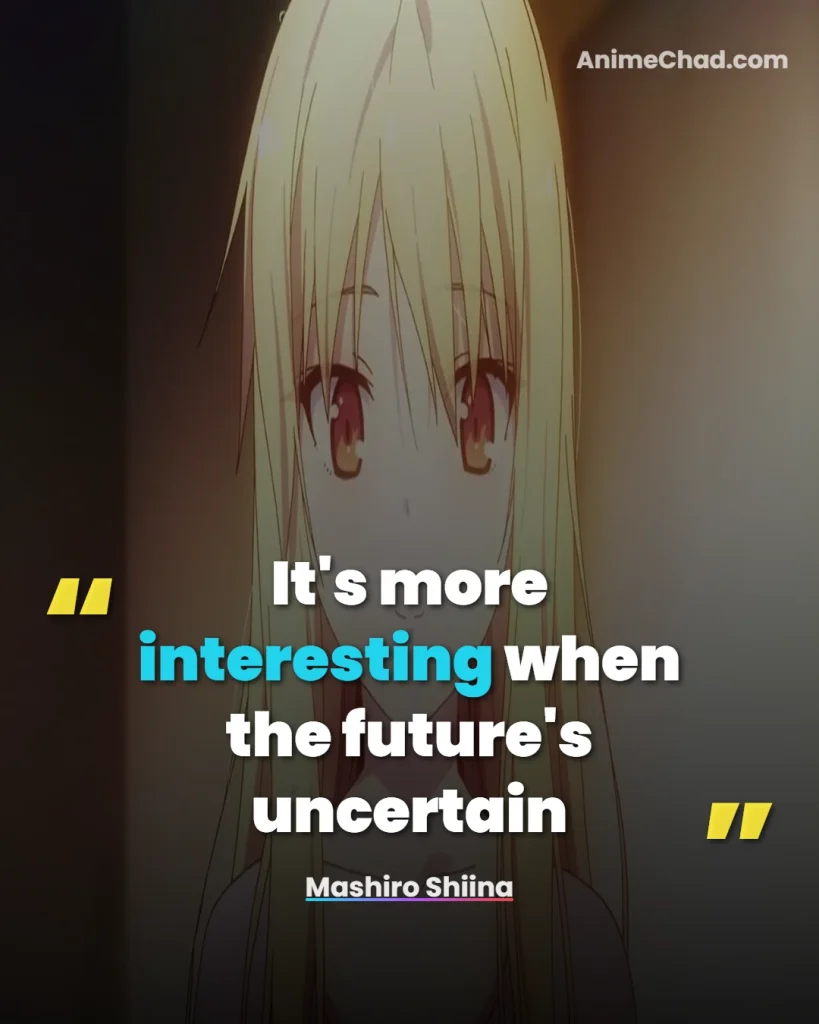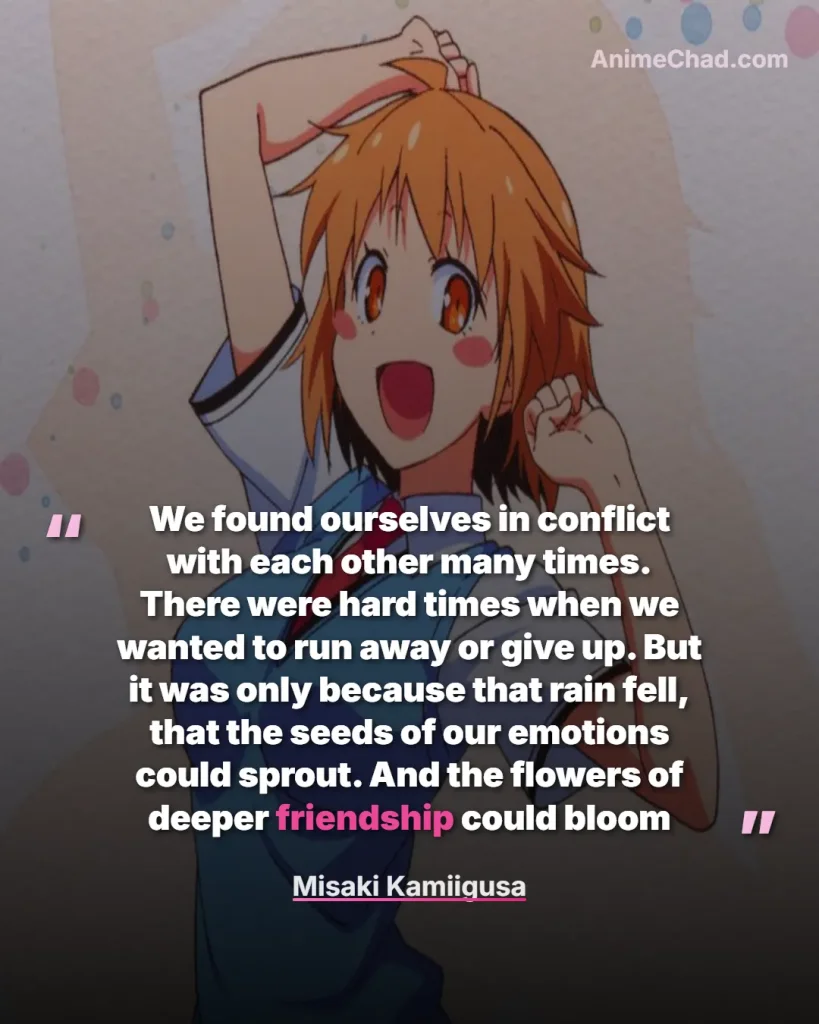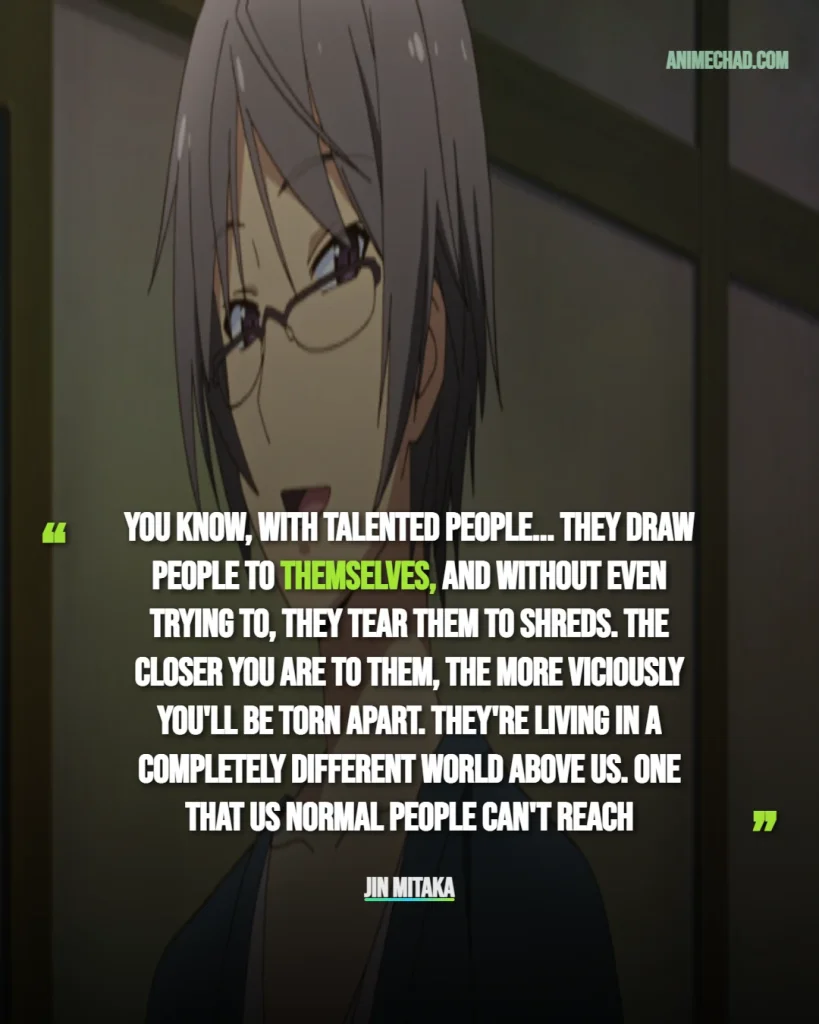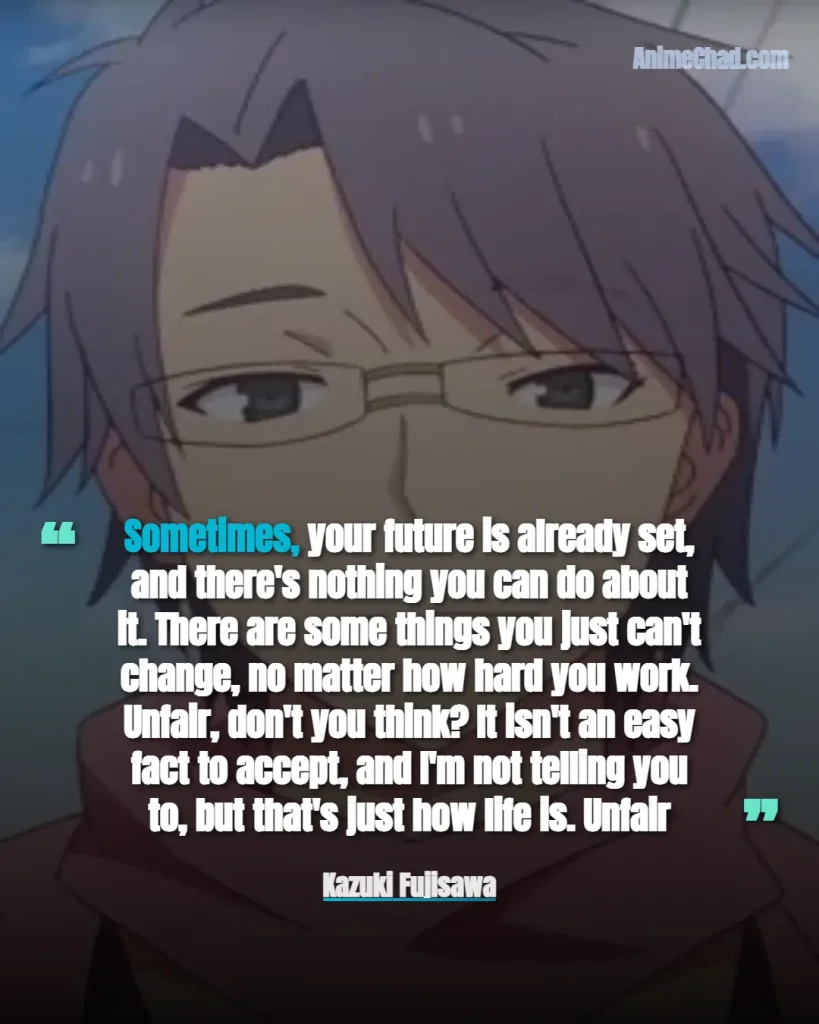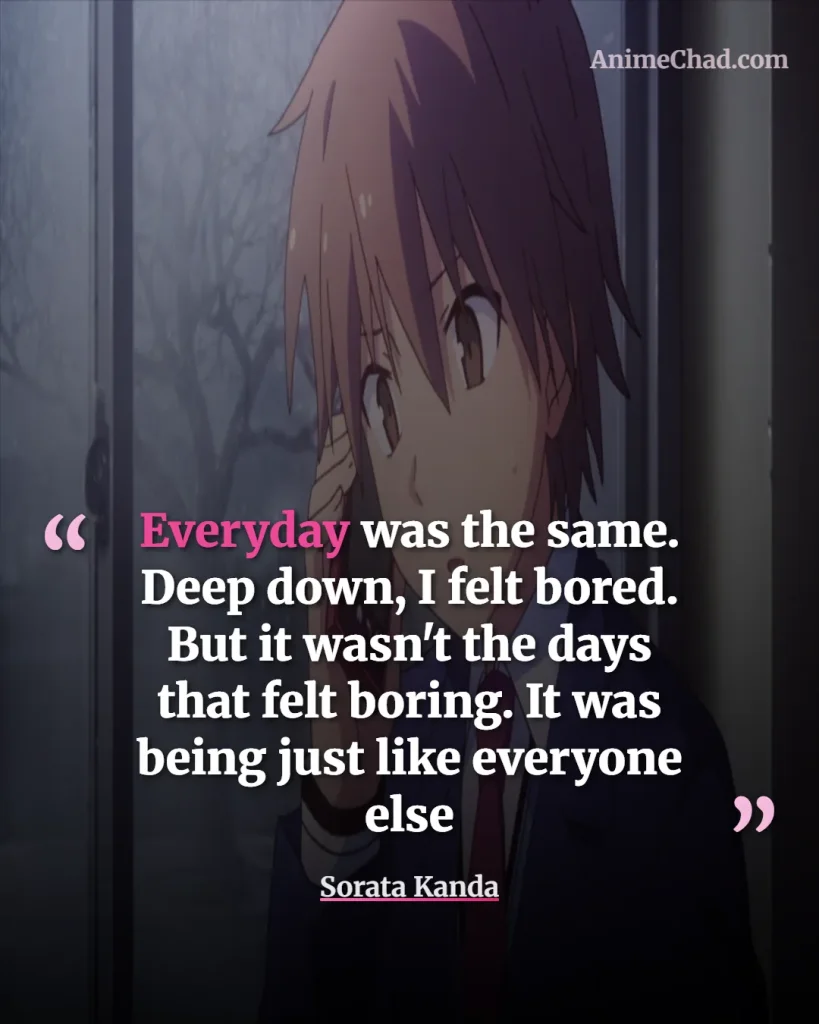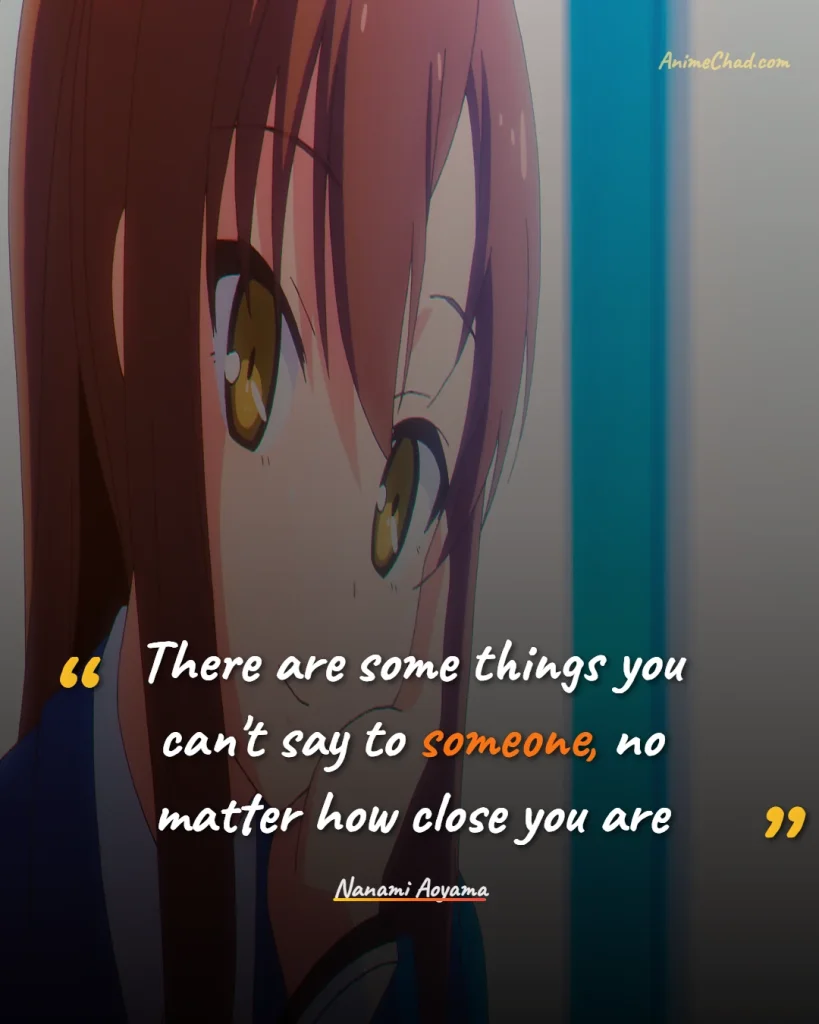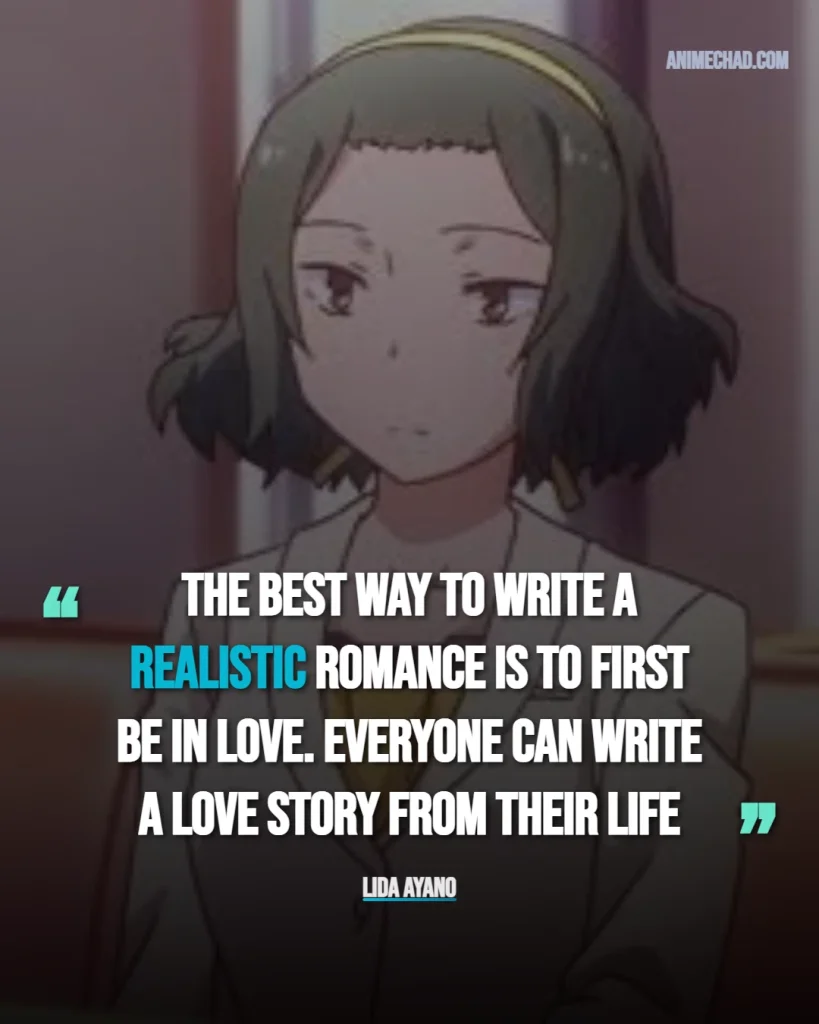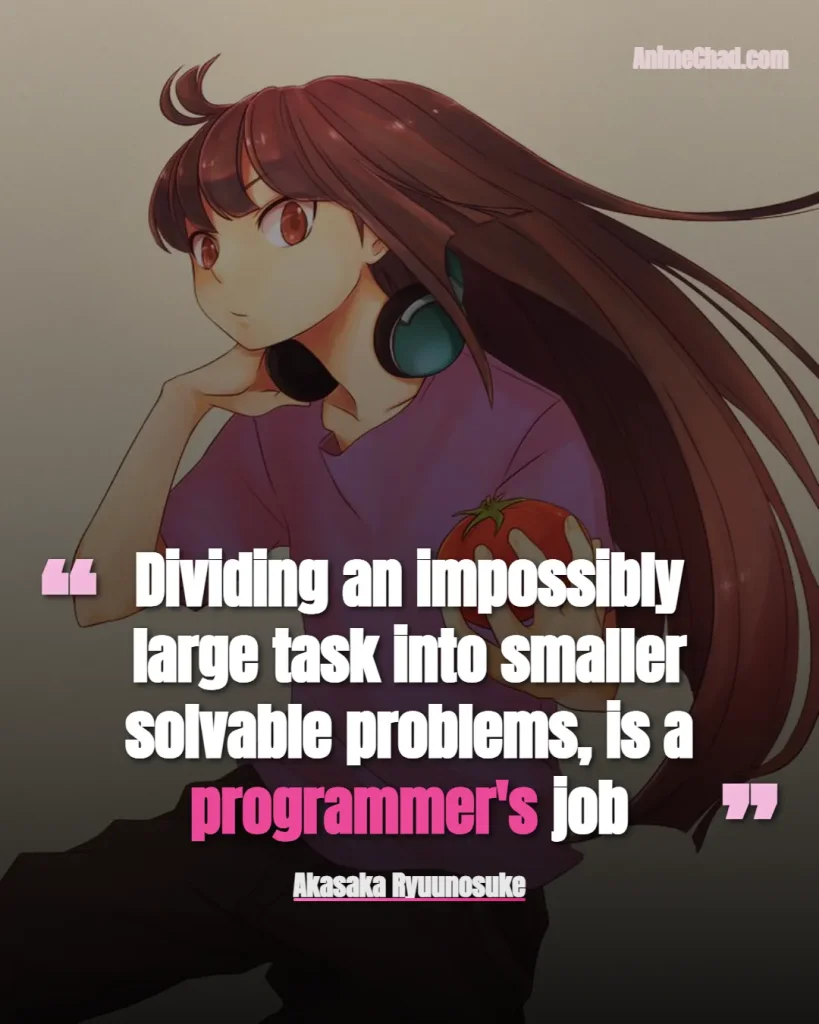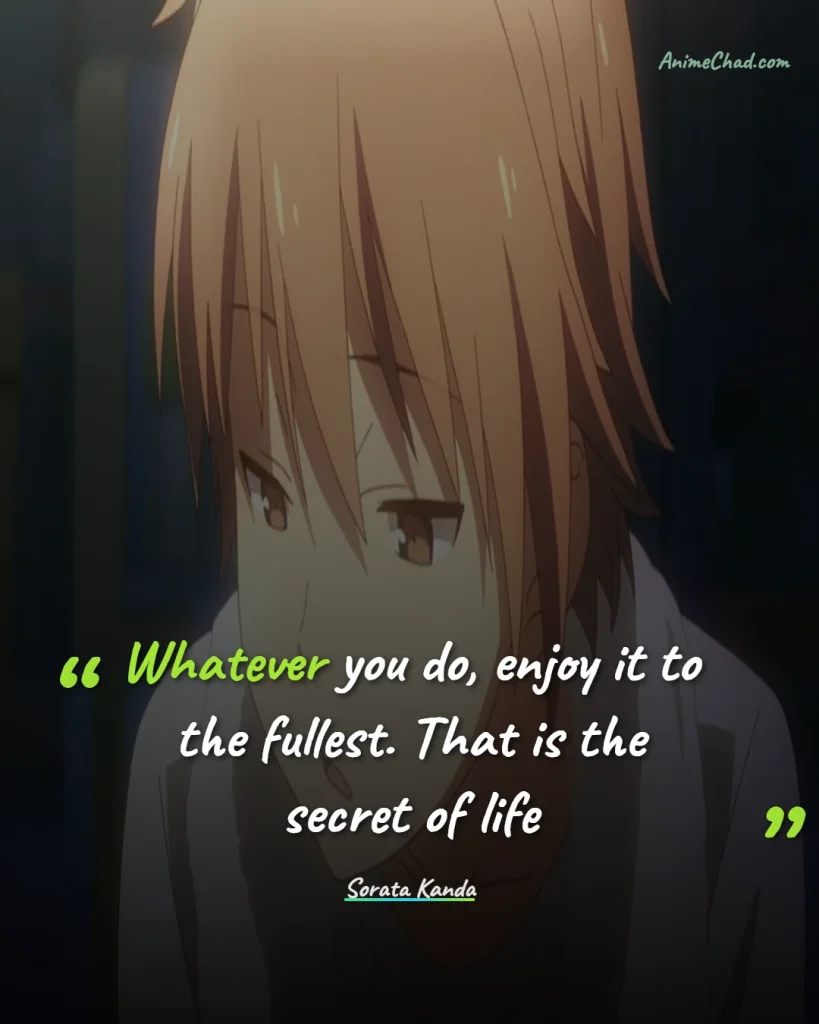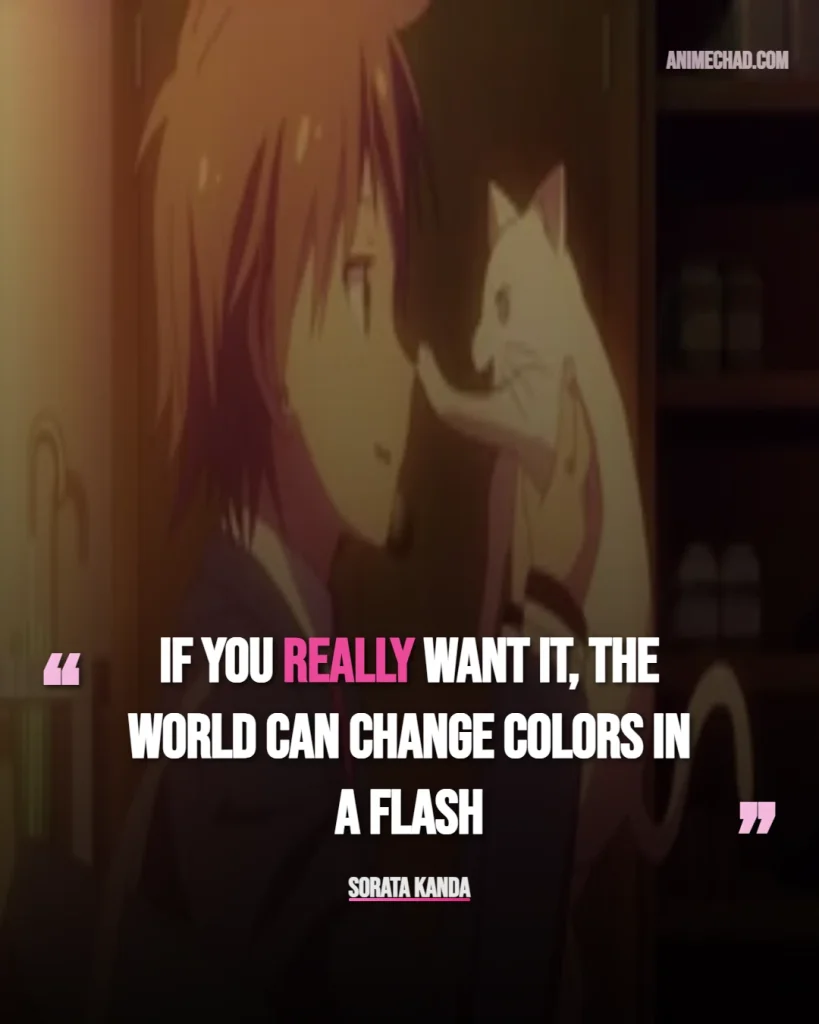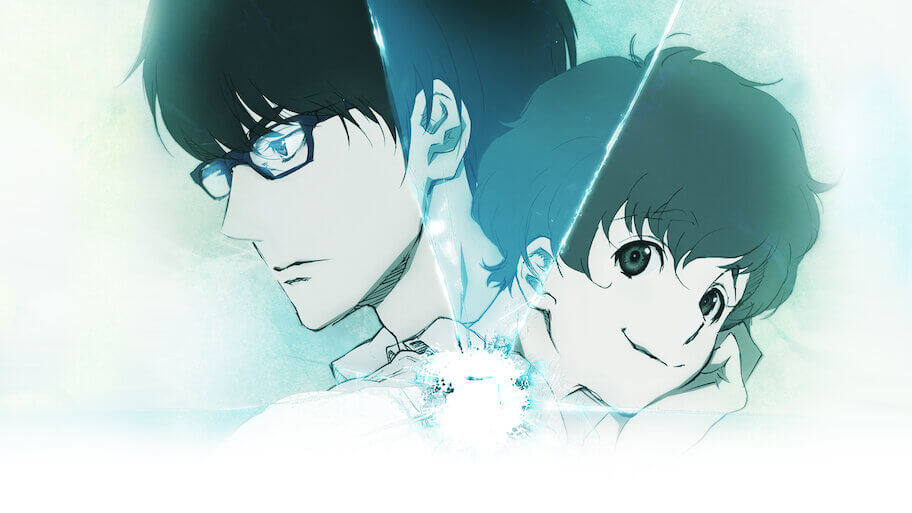The Pet Girl of Sakurasou follows Sorata Kanda, an ordinary high school student living in a dormitory for eccentric artists, who becomes the caretaker for the brilliant but socially inept painter Mashiro Shiina. The series delves into themes of talent versus hard work, the pursuit of dreams, and the complexities of young love and personal growth amid everyday struggles.
This curated collection of 25 quotes highlights pivotal moments, character evolution, and the emotional resonance of chasing aspirations in a world that often favors the gifted.
It’s more interesting when the future’s uncertain
Episode 3 (So Close, So Far…)
Mashiro Shiina
Mashiro’s reflection captures her innocent embrace of unpredictability, marking her growth from isolated genius to someone open to connections, tying into the theme of uncertain dreams.
You need to decide where you belong before anything else. If you can do that, you can decide what you want to do
Episode 4 (A World Changing Colors)
Jin Mitaka
In a quiet advisory talk with Sorata, Jin underscores self-identity as the foundation for ambition, highlighting Sorata’s budding resolve and the series’ focus on finding one’s path amid doubt.
If you forced someone to do something they didn’t want to do, they’d just end up hating life
Episode 1 (Cat, White, Mashiro)
Chihiro Sengoku
Chihiro’s blunt wisdom during Sorata’s initial frustration with Mashiro emphasizes free will, fostering Sorata’s empathy and development as a supportive figure in the dorm’s chaotic harmony.
Being able to realize your own fault is a virtue
Episode 9 (An Autumn Storm Blows In)
Akasaka Ryuunosuke
Ryuunosuke’s rare interpersonal insight comes during a group conflict, promoting accountability that aids his social thawing, reflecting the theme of growth through honest self-reflection.
We found ourselves in conflict with each other many times. There were hard times when we wanted to run away or give up. But it was only because that rain fell, that the seeds of our emotions could sprout. And the flowers of deeper friendship could bloom
Episode 12 (Rain, After All Has Passed)
Misaki Kamiigusa
Misaki’s heartfelt monologue after a stormy argument with Jin reveals vulnerability, symbolizing resilient bonds and her emotional maturity, central to the series’ exploration of enduring relationships.
This area feels weird, it’s been throbbing hard since that time. When you told me not to go. When you held me so tight. It won’t go away. Your voice is still in my ear. What happened to me? Is this… love?
Episode 6 (The Blue After the Rain)
Mashiro Shiina
In a tender post-rain moment of realization, Mashiro questions her feelings for Sorata, showcasing her rare emotional awakening and the theme of love emerging from protective care.
A normal person looks away from what they don’t want to see even though they know there are things they can only acquire if they face the things they hate
Episode 8 (Let’s Fire a Big Firework)
Sorata Kanda
Sorata’s introspective words follow his presentation failure, driving his determination to confront fears, illustrating his development from complacency to proactive dreamer.
Opportunities wait for no one! If you let an opportunity slip through your fingers with an excuse like, “I wasn’t prepared.” You’ll never get another opportunity like that again! But it is your life. Live it the way you want
Episode 10 (The Passionate Creator)
Sorata Kanda
Amid Nanami’s career crossroads, Sorata motivates her pursuit of voice acting, embodying his growing confidence and the series’ motif of seizing fleeting chances despite setbacks.
You know, with talented people… They draw people to themselves, and without even trying to, they tear them to shreds. The closer you are to them, the more viciously you’ll be torn apart. They’re living in a completely different world above us. One that us normal people can’t reach
Episode 7 (Her Attack of Homesickness)
Jin Mitaka
Jin’s melancholic observation during a family visit highlights the isolation of genius, deepening Sorata’s understanding of Mashiro and the painful divide between talent and effort.
Sometimes, your future is already set, and there’s nothing you can do about it. There are some things you just can’t change, no matter how hard you work. Unfair, don’t you think? It isn’t an easy fact to accept, and I’m not telling you to, but that’s just how life is. Unfair
Episode 14 (Christmas, Sakurasou Style)
Kazuki Fujisawa
In a poignant holiday conversation, Kazuki confronts Sorata with life’s inequities, spurring his resolve to defy fate and connecting to the broader struggle of ordinary aspirations.
Everyday was the same. Deep down, I felt bored. But it wasn’t the days that felt boring. It was being just like everyone else
Episode 2 (I’ve Painted Pictures)
Sorata Kanda
Sorata’s early dissatisfaction sparks his move to Sakurasou, initiating his journey from mediocrity and underscoring the theme of breaking free from mundane routines.
Love is simply an electrical bug in the human neural circuit
Episode 11 (A New Life)
Akasaka Ryuunosuke
Ryuunosuke’s cynical quip during a tech-inspired debate rationalizes emotions, yet hints at his hidden affections, adding layers to his reclusive character arc.
I haven’t done anything yet. Getting depressed and losing confidence is way too egotistical
Episode 16 (I’ve Always Loved You…)
Sorata Kanda
After Nanami’s confession, Sorata rejects self-pity, fueling his game development passion and highlighting perseverance as key to personal evolution.
There are some things you can’t say to someone, no matter how close you are
Episode 13 (I Think I Like You)
Nanami Aoyama
Nanami’s hesitant admission during a quiet evening reflects unspoken affections, emphasizing emotional barriers and her growth in vulnerability.
There’s no point in dwelling on the past, so I’m trying to think of the future instead
Episode 18 (And Then, Towards the Future)
Sorata Kanda
In a reflective post-failure talk with Mashiro, Sorata shifts focus forward, marking his maturation and the series’ emphasis on future-oriented hope.
The best way to write a realistic romance is to first be in love. Everyone can write a love story from their life
Episode 5 (The Serious Girl of Sakura Dormitory)
Lida Ayano
Ayano’s advice to Mashiro on manga creation draws from personal experience, illustrating how lived emotions enhance art and tie into authentic relationships.
Dividing an impossibly large task into smaller solvable problems, is a programmer’s job
Episode 20 (Mayhem at the Game Competition)
Akasaka Ryuunosuke
Ryuunosuke’s practical philosophy aids the group’s game project, showcasing his technical growth and the theme of tackling overwhelming dreams step by step.
If you put your mind to it, you can change the color of your world in an instant
Episode 22 (The Changing Seasons)
Sorata Kanda
Sorata’s empowering realization during the finale confession to Mashiro symbolizes transformation, encapsulating his full arc from doubt to self-assured creator.
Is this friendship so weak it’d disappear with the demolition of a single building?
Episode 20 (Mayhem at the Game Competition)
Akasaka Ryuunosuke
In a heated dorm defense debate, Ryuunosuke challenges superficial ties, promoting deeper loyalty and his emerging bond with the residents.
I pretended it was someone else’s fault that nothing happened. But I was wrong
Episode 19 (Those Concealed Settings)
Sorata Kanda
Sorata owns his procrastination before a crucial deadline, a turning point in accountability that drives his artistic breakthrough and theme of self-responsibility.
Whatever you do, enjoy it to the fullest. That is the secret of life
Episode 24 (Sakurasou Burning Down)
Sorata Kanda (inspired dialogue)
In the emotional climax amid the dorm’s fate, Sorata embraces joy in creation, reflecting his ultimate growth and the value of passion over perfection.
Sorata no baka
Episode 15 (Sorata’s Birthday)
Mashiro Shiina
Mashiro’s affectionate scolding during a surprise party reveals her softening demeanor, blending humor with her developing expressiveness in love.
If you really want it, the world can change colors in a flash
Episode 4 (A World Changing Colors)
Sorata Kanda
Sorata’s confession of his game-making dream to Mashiro ignites mutual inspiration, highlighting rapid personal change and the power of shared ambitions.
Oh youth, why art thou such a cruel mistress?
Episode 9 (An Autumn Storm Blows In)
Sorata Kanda
Amid romantic tensions with Nanami, Sorata laments youthful heartaches, capturing the bittersweet growth pains central to the series’ coming-of-age narrative.
This world is so vast and wide. And yet, we happen to be together
Episode 23 (None Of This Is Fiction)
Mashiro Shiina
In a serene stargazing moment, Mashiro affirms her bond with Sorata, evoking wonder at fate and concluding her arc toward emotional openness.

